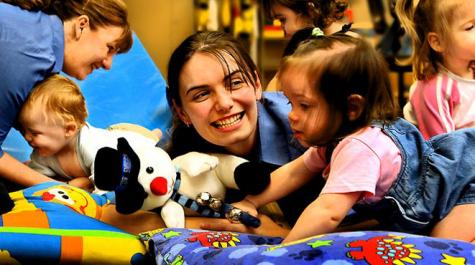Children who use centre-based child care and multiple care arrangements across their early years are better prepared for school, a new QUT study has found – but there may also be negative impacts.
Dr Chrystal Whiteford of QUT’s Faculty of Education says that children in centre-based care or other early childhood care arrangements generally out-perform their peers in early school-based education.
But as well as having positive benefits, it can also have the opposite.
"While the study revealed developmental benefits of early child care, there were also potential negative impacts upon children's social-emotional, academic and health outcomes,” Dr Whiteford said.
Dr Whiteford said toddlers under 3 years of age, who experienced early centre-based child care also had the potential to experience increased emotional problems, behavioural problems and poor health at 6 to 7 years of age.
She said infants in centre-based care might also experience decreased language and literacy skills at 6 to 7 years of age.
"Children who experienced more than 20 hours per week of child care, had the potential to experience behavioural problems and poor health at 6 to 7 years of age, and children enrolled in centre-based arrangements as infants may experience increased poor health at the age of 6 to 7 years."
But her research also found instability in arrangements in the early years had the potential to increase emotional and behavioural problems, with multiple arrangements at 2 to 3 years of age being linked to poor behaviour.
Dr Whiteford also cautions that these outcomes can be linked to family circumstances.
"What the study found was there are a number of early childhood factors with the potential to influence children's later development," Dr Whiteford said.
"We know from birth to three years of age is a crucial time period in a child's life and plays a critical role in laying foundations for future development.”
In other words, while the role of early childhood education and care is important, so are the other circumstances of a child’s life and neither can be looked at in isolation of the other.
Dr Whiteford warned it was important to consider all these findings in the context that every child's experience was individual and every child's circumstances were different.
"It's essential that we don't just take these findings alone," she said.
"Child and family characteristics play a large role in a child's developmental outcomes, above that of their early child care experiences.”
She says that it also has to be considered in the context of the quality of Australian child care which is shown to be high by international comparisons.
"We need to be taking a closer look at all the risk and protective factors and looking for interventions that can lead to improved outcomes for all children.”
Dr Whiteford said with an increasing number of Australian children in child care arrangements, it was important to understand the relationships between child care and developmental outcomes.
"While this research gives us some answers, it also opens up more questions," she said.
* * *
You can read the full report here.



















__small.png)










